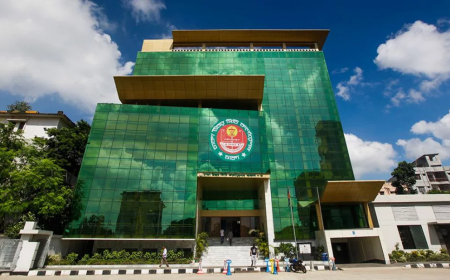Is It Time for Bangladesh to Look Beyond the Dollar?
The time for action is now. Bangladesh must look beyond Western-dominated financial institutions and embrace a multipolar financial world that offers better terms, greater sovereignty, and sustainable development.

When Morgan Stanley issued ¥2 billion ($279 million) in Panda bonds in China's interbank market in July 2025, it sent shockwaves through global financial circles. This wasn't just another financial transaction; it was a geopolitical statement of historic proportions.
For the first time, a Wall Street titan had chosen to bypass the familiar terrain of dollar-denominated debt to tap directly into Chinese capital markets at a remarkably low 1.98% coupon rate.
Within weeks, another development signaled a shift: the BRICS-backed New Development Bank (NDB) announced plans to issue its first Indian rupee-denominated bond before March 2026. Having already established itself as the largest Panda bond issuer with RMB 61.5 billion in Chinese yuan issuance, the NDB's pivot to rupees marks an acceleration toward a multipolar financial world.
These moves symbolize a profound shift in the global financial architecture. The irony is palpable: leading international institutions are rapidly diversifying their funding sources while Bangladesh faces a new constraint -- the International Monetary Fund has, for the first time, set a ceiling on how much the country can borrow from abroad, limiting Bangladesh to maximum foreign borrowing of $8.44 billion during the 2025-26 fiscal year.
This divergence represents both a warning and an opportunity for Dhaka.
As the global financial system's tectonic plates shift beneath our feet, Bangladesh stands at a critical juncture: continue its reliance on Western-dominated financial institutions and overpriced dollar debt, or forge a new path of financial sovereignty through strategic diversification.
The Silent Revolution Against Dollar Dominance
Beneath the headlines of trade wars and geopolitical tensions, a financial revolution is quietly unfolding. The United States represents approximately 25% of global GDP, yet the U.S. dollar constitutes about 60% of global foreign exchange reserves. This asymmetry has created a vulnerable, dollar-dependent global financial system that many nations are urgently seeking to escape.
The mechanisms of this escape are being built daily.
The European Union is promoting euro-based energy trade. China's Cross-Border Interbank Payment System (CIPS) offers alternative settlement channels. BRICS, ASEAN, and SCO nations are increasingly settling trade in local currencies.
The de-dollarization trend is most visible in commodity markets, where a large and growing proportion of energy is being priced in non-dollar-denominated contracts.
This revolution challenges the very foundation of a system where the dollar-centric International Monetary and Financial System entrenches global inequalities and debt crises.
As this system evolves, Bangladesh faces both unprecedented risks and extraordinary opportunities.
Bangladesh's Debt Dilemma
Bangladesh's economic miracle -- once celebrated for lifting millions from poverty -- shows concerning strains.
The country's external debt has risen dramatically from $20.3 billion in FY2010 to $80.19 billion as of June 2025, with debt servicing costs rising dramatically. Annual repayment of foreign loans has grown from $876 million in FY2010 to $4 billion in the last fiscal year.
Perhaps most alarmingly, the IMF's Debt Sustainability Analysis has reclassified Bangladesh as a "moderate-risk" country for two consecutive years.
Bangladesh's debt-to-export ratio jumped to 162.7% in FY24, significantly exceeding the IMF's earlier projections. This vulnerability is exacerbated by currency depreciation, which has dramatically increased the local currency cost of servicing dollar-denominated debt.
These challenges occur within a broader economic context of emerging vulnerabilities. GDP growth is expected to slow to 3.3% in FY2024-2025, inflation remains stubbornly elevated, and limited foreign exchange reserves -- which stood at $20.4 billion in March 2025 -- create additional pressures.
The Strategic Alternative
The solution to Bangladesh's debt dilemma lies in embracing the same financial diversification that Morgan Stanley, the New Development Bank, and other sophisticated actors are already pursuing. Several strategic pathways present themselves:
First, Bangladesh should pilot yuan integration for its trade with China. With China as Bangladesh's largest import partner, shifting even 10-15% of bilateral trade to yuan settlement would reduce transaction costs and dollar dependency while building strategic leverage.
The infrastructure for this transition is already developing -- Chinese banks like ICBC and CCB maintain presence in Dhaka, while China's CIPS system offers an alternative to SWIFT.
Second, reserve diversification offers protection against dollar volatility. Allocating 5-7% of Bangladesh's foreign exchange reserves to yuan assets -- particularly liquid Chinese government bonds and Panda bonds from multilateral institutions like AIIB -- would provide both yield advantages and risk mitigation.
The Asian Infrastructure Investment Bank's recent Panda bond issuance, which attracted record demand and was 3.2 times oversubscribed, demonstrates the growing liquidity and appeal of this market.
Third, Bangladesh should explore its own Panda bond issuance. Following the successful examples of multilateral institutions like the New Development Bank, which priced its recent RMB 6 billion 5-year Panda Bond at just 1.7%, a sovereign Panda bond issuance could create substantial interest savings compared to Bangladesh's dollar borrowing costs around 8%.
The technical process requires preparation, but the potential savings justify the effort.
Fourth, Bangladesh must look beyond traditional currencies and learn from the NDB's example of exploring Indian rupee financing. As regional trade grows, developing capabilities in multiple currency markets will provide strategic flexibility and better terms.
Geopolitics and Strategic Autonomy
Bangladesh's debt strategy cannot be divorced from broader geopolitical realities. The United States' increasing financial unpredictability further complicates the landscape. The US Federal Reserve notes that while the dollar's international usage remains largely unchanged over the past five years, potential challenges to dollar dominance are emerging.
The international role of the dollar faces questions due to policy uncertainty and concerns about the US fiscal outlook. This uncertainty makes dollar dependency increasingly risky for Global South nations.
Bangladesh must navigate carefully between major economic powers while preserving its strategic autonomy.
The country should frame its financial diversification not as alignment with any particular bloc but as a pragmatic response to global financial trends and its own development needs. This approach aligns with Bangladesh's traditional non-aligned foreign policy while maximizing its options in an increasingly competitive international environment.
Sovereign Financial Strategy
Implementing this strategic shift requires decisive action across multiple domains, especially under the new constraints of IMF borrowing limits.
Bangladesh should establish a specialized debt management unit within the Bangladesh Bank focused on non-traditional financing sources, staffed with experts in Chinese financial markets, digital currencies, and alternative payment systems.
This unit should develop strategic relationships with key institutions including the People's Bank of China, Asian Infrastructure Investment Bank, and New Development Bank.
Simultaneously, Bangladesh must accelerate domestic financial reforms to strengthen its foundation for sovereignty. The World Bank's recent commitment to improve transparency, accountability, and financial sector stability represents exactly the type of foundational reform needed.
Strengthening corporate governance, aligning financial reporting with international standards, and enhancing the Bangladesh Bank's resolution powers would build investor confidence and potentially reduce the risk premiums on Bangladesh's international borrowing.
Critically, Bangladesh must enhance its project selection and implementation capacity. With foreign borrowing now capped by the IMF, every dollar of debt must yield maximum development impact.
Implementing rigorous cost-benefit analysis for all debt-funded projects, enhancing monitoring and evaluation systems, and strengthening anti-corruption measures will improve the effectiveness of borrowed funds and reduce the risk of debt distress.
A Sovereign Future
The global financial system's restructuring will not wait for hesitant nations. As Morgan Stanley's Panda bond and NDB's rupee ambitions demonstrate, market leaders adapt rapidly to new realities.
For Bangladesh, operating under new IMF borrowing constraints, the choice is not between dollar dominance and yuan alternative -- but between strategic diversification and vulnerable dependency.
Bangladesh has confronted greater challenges throughout its remarkable history. The same nation that overcame unimaginable obstacles in 1971 today stands poised to model financial sovereignty for the Global South. The tools are available; the pathways are clear. What remains is the courage to take that first decisive step -- to become not just an adaptor to the new financial era, but its architect.
The time for action is now. Bangladesh must look beyond Western-dominated financial institutions and embrace a multipolar financial world that offers better terms, greater sovereignty, and sustainable development. The Panda bond heard around the world, followed by NDB's rupee ambitions, should be Bangladesh's wake-up call to forge a new financial future -- on its own terms.
Zakir Kibria is a Bangladeshi writer, policy analyst and entrepreneur based in Kathmandu, Nepal. He can be reached at [email protected].
What's Your Reaction?














































































